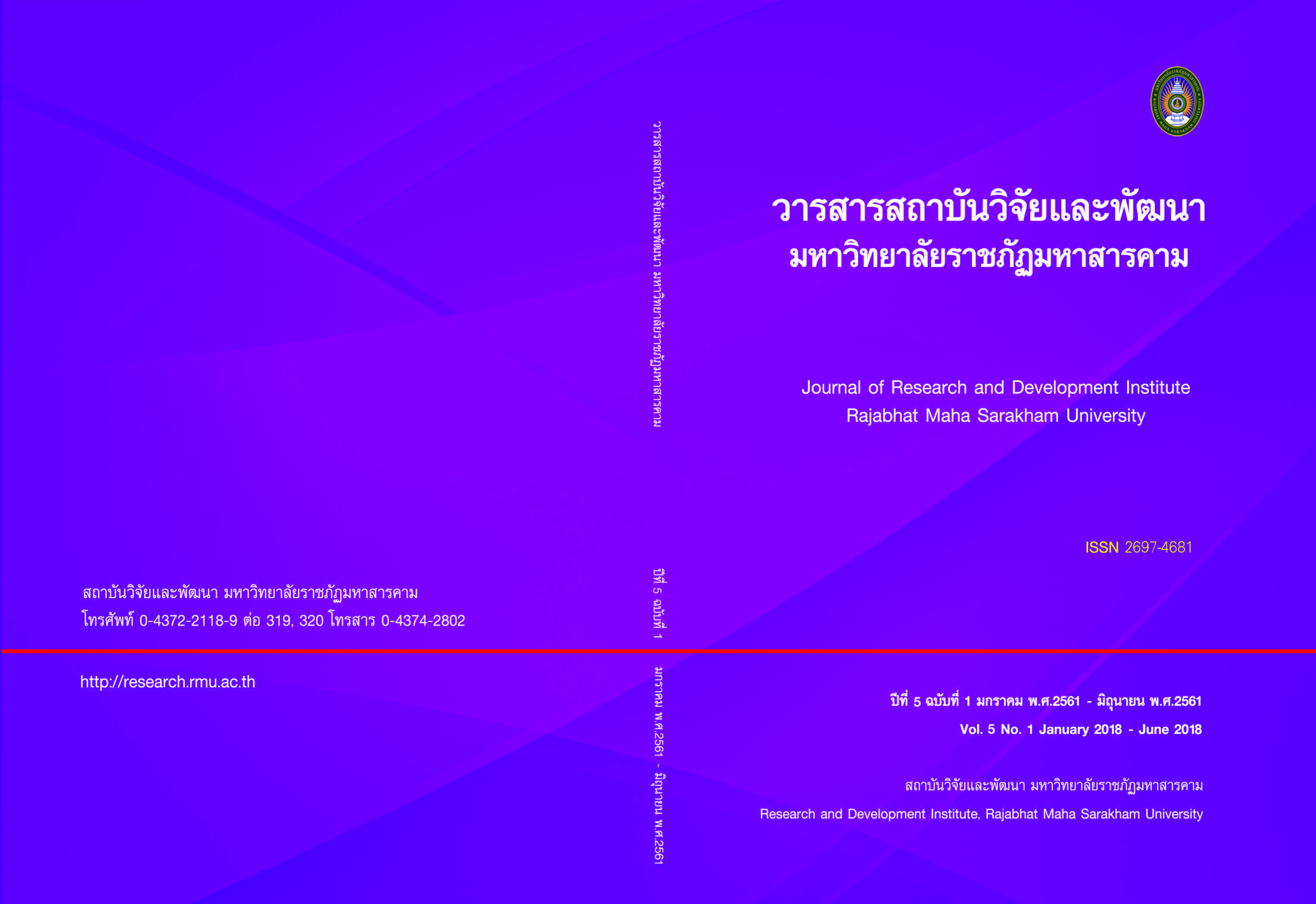Model of Creating Sustainable Food Security of Households in NongMek Sub-District, Nachueak District, MahaSarakham Province
Keywords:
Food Security, Self–sufficiency, Philosophy of Sufficiency EconomicAbstract
This study is mixed methods research by using participatory rural appraisal (PRA)
research, the sample was selected with purposive sampling living in Nong Mek SubDistrict, Nachueak District, MahaSarakham consisted of 400 households, to study
household food security and select target groups from community leaders, folk
philosopher 50 villagers use forest and water. The methods are group meeting and
brainstorming, to study the model of food security of households and communities
from the natural resource base.
The results are as follows: analyze the risk factors, vulnerability and potential of
the food security community. The community is self-reliant on food from three food
sources consisted of 1) in the home, households can produce their own food using
community ingredients.2) Food source from water and 3) food source from the forest.
The food security of the household has three main components: 1) the ability to find
food. (With adequate food), 2) Access to the food of the household (Sufficient
resources for all households to find food) and 3) the use of food (With knowledge and
how to take advantage of food, including access to sanitation and water resources) the
conserve and restore sufficient food sources. People in the community have a
common practice it helps to maintain the food source of the community. Do not
dispose of wastewater. Not deforestation eats vegetables. No fishing in the spawning
season. Help keep the natural resources from deteriorating. The lives sufficiently,
cultivate a sense of reforestation, encourage people in the community to reduce the
use of chemicals, address ecological sustainability and safety in the future, such as
reducing the use of chemicals. Keep your own produce sufficient. The seeds are
planted in the next season and tradition to generation generations and to share or
exchange food in the community.
References
Office of the National Economic and Social Development. (2012). National Economic and Social Development Plan Vol. 11 : 2012-2016. [Online] From : http: //www.nesdb.go.th/ Default.axpx? tabid395 [4March 2012]
Piyanart Imdee (2004). Food Security of Rural Community : a Case Study of PaKha Village, Suak Sub-District, Muangnan District, Nan Province. Master of Community Development Thesis : Thammasat University.
Somporn Issawalanon. (2014). “Agriculture and Food Security Threats and Solutions.” The Special lecture on stage of “The Local Community is the Leader in
Innovation and Management.” 2 March 2014 at BITEC Convention Center,Bangkok.
Songsiri Wichiranon. (2012). “The Way of Life and Local Food Security in the Southern Part”. RMUTP Research Journal, 8 (1) : January-June 2012
Surachai Raksachart. (2002). Food Security of Maginalized People : Consumption Patterns and Sournce of Food Selected Households in a Karen Community,
Western Thailand. Master of Science Thesis : Chiang Mai University.
Sustainable Agriculture Foundation (Thailand). (2011). “Report on Food Security Indicators” Sustainable Agriculture Foundation (Thailand) under Agricultural and Food Crisis Driven Projects according to Resolution of National Health
Assembly 2008. Bangkok : Sustainable Agriculture Foundation (Thailand)
Suthanee Maliphan. (2009). Food security of Luawa, Ban Pakham, Borkue District, Nan Province. Master of Arts Thesis : King Mongkut's University of Technology Thonburi
Thananchai Mungjit, Bumpen Keowan and Benchamas Yooprasert. (2010). “Potential Strengthen Guidelines of Food Security in Mae Surin Village, Khun Yuam District,
Mae Hong Son Province”. The 2nd STOU Graduate Research Conference : Sukhothai Thammathirat Open University
Wipaphan Upanisakorn and Natnalin Upanisakorn. (2017). “The Approach for Developing Community’s Morality Based Philosophy of Sufficiency”, Journal of
Research and Development Institute, Rajabhat Maha Sarakham University, 4 (1) :January–June 2017, p. 79-96
Downloads
Published
How to Cite
Issue
Section
License
Articles that are published are copyrighted by the authors of the articles







